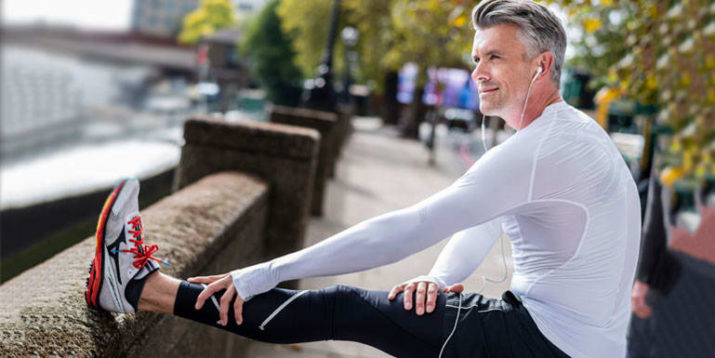How Exercise Is Good For Your Brain Health

The motivation for people to live healthy lives can include a multitude of reasons: wanting to have the stamina to play with our young children, wanting to avoid decrepitude as we get older, and wanting to look slim and toned in a swimsuit, for example. Regardless of what drives you to work out, research suggests that exercise can be beneficial in a way that has nothing to do with endurance or appearance: Physical activity may be the key to keeping your brain sharp as you age.
How Exercise Affects Brain Health
A study published the journal Neurology examined the cognitive function of elderly participants and found that those who made time for fitness had younger, quicker brains than those who did not. “The number of people over the age of 65 in the United States is on the rise, meaning the public health burden of thinking and memory problems will likely grow,” study author Clinton B. Wright said in a press release. The U.S. census bureau projected that by 2033, the U.S. population of people 65 years or older will be greater than the number of people younger than 18 years old in the country. “Our study showed that for older people, getting regular exercise may be protective, helping them keep their cognitive abilities longer,” Wright said. Now how’s that for some motivation to push play?
At the beginning of the study, 876 participants reported their activity level, had a brain MRI exam, and took tests to assess their memory and thinking skills. Ninety percent of the group reported doing light exercise, such as walking and yoga, or no exercise at all. The remaining 10 percent reported doing moderate to high intensity exercise, including running, aerobics, or calisthenics. Approximately seven years after the initial assessment, the participants were given the tests again, and then once more five years after that.
Among the people who began the study with no signs of memory and thinking problems, those who reported low levels of physical activity had a greater decline in their test performance after five years than those who reported high activity levels. They performed worse on assessments of how fast they could perform simple tasks and how many words they could remember from a list. Researchers calculated the difference in brain performance as being equal to 10 years of aging, even when adjusted for factors that could affect brain health, such as smoking, alcohol use, high blood pressure, and body mass index.
Yoga and Brain Health
This isn’t the only study that’s discovered a link between working out and having a strong mind. Not only does yoga help with stress relief, flexibility, weight loss, and overall body toning, it’s also been shown to positively affect the brain. Studies have shown that yoga can possibly foster neurogenesis, or the growth and development of neural tissue. Yogis and meditation practitioners have been found to have less of a natural decline in intellect and reasoning skills as they age, allowing them to solve new problems and tackle challenges (both on and off the mat).
“Any time you exercise, your brain grows new neurons, and the interesting thing about neurogenesis is that unless you take those new neurons and do something useful with them, they often don’t last,” says Johnson. “If you want to increase gray matter — neurons — as you age, and the tendency is for them to decline as we age, you have to do something to integrate those new neurons into your life.”
Another study found that three months of yoga and meditation helped more than memory exercises to diminish the cognitive and emotional issues that can precede dementia. A small study also showed that older adults who practice yoga had more activity in the caudate, an area of the brain that influences learning, particularly memories. So the next time you decide to practice your asanas, you can feel good about working your body and your brain.
The 20-Second Takeaway
Even if you don’t care about six-pack abs, having a sharp wit, a strong memory, and the ability to continue learning might be enough motivation to get your sweat on. Exercise helps keep cognitive abilities strong, such as the ability to perform simple tasks quickly and solve problems. Additionally, regular physical activity exercise can even help you save money in the long run by reducing medical costs.
You can push your body to keep your mind healthy with short, intense workouts like 22 Minute Hard Corps or INSANITY: MAX 30. Or, give 3 Week Yoga Retreat a try to foster a healthy brain while releasing some stress. Head over to Beachbody On Demand for all these programs, and more.
And while exercising is a great way to keep your mind youthful, there are other steps you can take to help you age gracefully. Check out four more tips that can help you live a long and healthy life.
